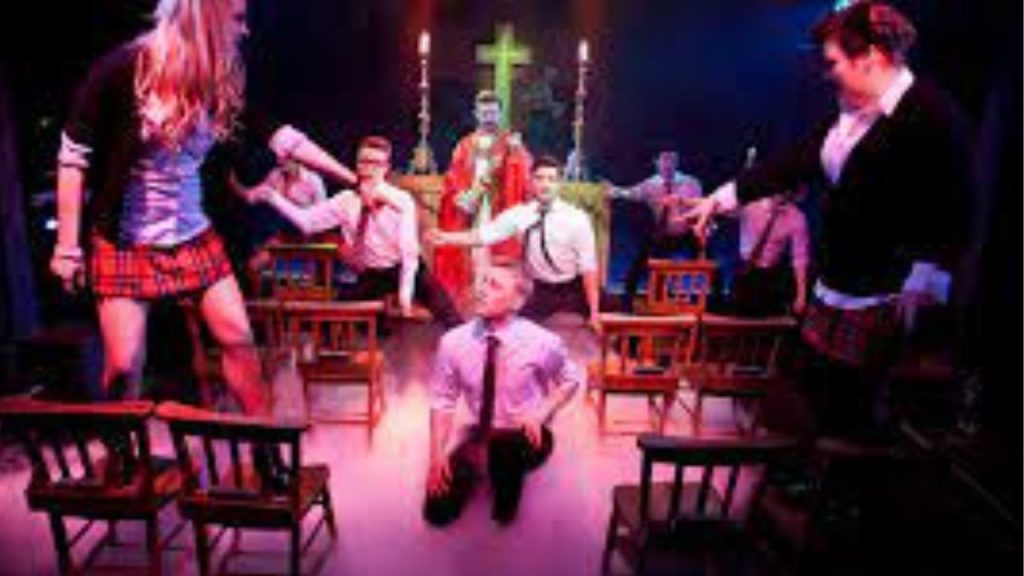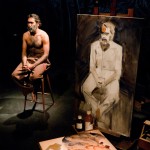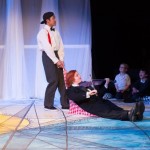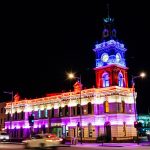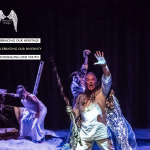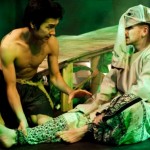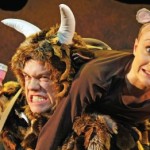Genre: Musical Theatre
Venue: Union Theatre 204 Union St, London se1 0 LX
Low Down
Jon Hartmere’s and Damon Intraboloto’s bare: the rock musical puts sexuality front and centre in the hazardous terrain of young people claiming their adult identity. As a result, the story of youths in their final year of high school at a Catholic boarding school is naturally full of teenage angst.
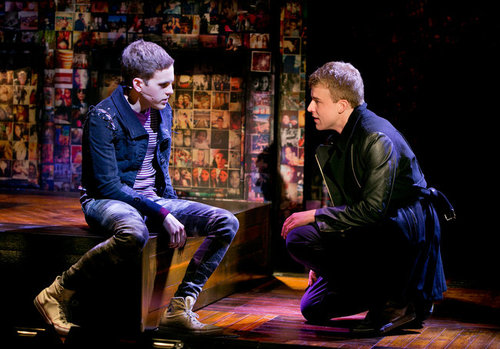
Identifying teenage dilemmas around the bare’s presentation of homosexuality, however, does not stand alone but is presented as an integral part of a young person’s unfolding of a whole constellation of interrelated subjects. This makes bare much more than a single-issue morality play: issues of gender roles, sexuality and intimacy, class factors, body image, religious moral codes, as well as spirituality and family expectations move swiftly and dynamically about the stage with wondrous youthful energy.
This creates a rich and complex world in which the loving relationship between two young males, Jason and Peter, can be viewed within the wider human context of any number of expressions of young love. To make the point even further metatheatrically, Hartmere and Intraboloto use Romeo and Juliet as the school production. Created under the guidance of the broadminded Sister Chantelle, Shakespeare’s play about star-crossed lovers is briefly restored in performance as it was originally played (as the good sister points out to her ignorant class) through Peter and Jason speaking of Romeo and Juliet lines to one another in rehearsal. Ominously, the effect of the drama in reaching its destructive end is also achieved as parents, Church and State fatefully influence young lives towards their tragic end.
Review
Director, Paul Taylor Mills, works his talented cast extremely effectively by recognising how the pivotal moments in each character’s life are linked in the religious setting of the school to the elicit spaces which the teenagers claimed for themselves such as the rave, Ivy’s birthday party and in the dormitories of the boarding school. The presence of drugs is treated equally representative of taking young people beyond the permitted school boundary.
The depth of the characterisation works around an ensemble of five leads (Jason/ Peter/ Nadia/ Ivy/ Matt) together with a well-drawn chorus of characters in other roles of Priest/, teacher (Sister Chantelle), mother (Clare) and students Tanya, Lucas, Kyra, Rory, Alan, Zack and Diane. Together, they are the key to the successful portrayal of a complex narrative. This is a production with no weak performers: rather, a flawless ensemble of actors, singers and dancers, punch out the storyline as well as the emotion.
Ross William Wild as Jason and Michael Vinsen as Peter are a well-balanced pair, showing how different individuals are inexplicably attracted to one another: in this case, Jason the ‘school jock’ sporty type and Peter the sensitive more artistic-leaning student. However, there are no stereotypes to be found in the musical: the theme of unrequited attraction bears down on other kids too as shown by Matt’s infatuation of Ivy.
bare represents teenagers with all their contradictions and messy lives: Lilly-Jane Young’s portrayal of Ivy in her two solos of “Portrait of a girl” and “All grown up” are stunning in their effect of giving the school ‘slut’ psychological depth. Melanie Greaney’s portrayal of Nadia is also a personal and intimate glimpse of the class clown. Her solos explore more self-deprecating tones in “Plain Jane Fat Ass” and “Quiet Night At Home”. Both girls show how they struggle to reconcile their outer appearance with their innermost hopes and dreams.
Ironically, the most under-developed character is that of the Priest. His platitudes in sermons and the confessional show a lack of humanity which impacts dangerously on the lives of the young people in his care. There is something decidedly odd about his extreme detachment, which convention tells us is based on celibacy.
By contrast, the message of Christian charity is developed through the drama teacher, Sister Chantelle, a role which Hanna Levane performs superbly as an earthy-black-gospel-singer. She gives the young people in her charge something real to butt up against as we see in her appearance of Peter’s dream as the Virgin Mary. The motown – style solo “911! Emergency”, complete with backing singers Fia Houston-Hamilton (Kyra) and Roanna Yeo (Tanya), is a highlight of the show.
On reflection, Sister Chantelle shows up the only bias I felt in the production and that was, taken overall, that women were characterised as being more courageous, hard working and flexible then men in their attitudes towards the crises that life brings around having children. Yvette Robinson’s portrayal of Clare, Peter’s mother, is iconic in this respect. She proves that 90% of parenting might simply be sticking around and the other 10% is the struggle with your own and your child’s disappointments. Ms Robinson brings depth, charm, humour and pathos to her cameo role. As I look around and see other’s crying during her solo “Warning”, I imagine them identifying with her journey as a single mother and the courage needed to just ‘hang in there’.
In contrast, fathers are presented as either absent or downright brutal. According to Jason, his father would beat him up and disown him if he were to come out as gay man, a fact that Peter simply can’t understand. On the other hand, Peter’s father has been absent all his life and his mother puts her husband’s desertion of her in no small way down to his disappointment in having an effeminate son. By the same token, Jason’s irresponsibility towards Ivy puts him in the same class as any of the thousands of absent fathers who do not link ‘making love’ to a woman and then caring for her and their child during pregnancy and beyond.
Within the context of Catholicism that decrees most contraception as, at least, a ‘venial sin’, Ivy is nonetheless still to be judged equally irresponsible: there’s also a suggestion that she might even have been foolish enough to believe that she could ‘trap’ Jason into having a relationship with her by getting pregnant. Her eulogy to him in the finale, however, shows that she is at least prepared to face ‘the mess’ in the end. In this respect, she will carry on in Clare’s tradition of bring up children alone.
What a mess, a perfect mess
Left alone to sort it out
In the sorrow, guilt, and rage
I keep coming back to doubt
Designer David Shields and Lighting Designer Tim Deiling need special mention in making the show work in the Union Theatre’s space with a high degree of spectacle and purposeful meaning. The transformation of the altar into both a bed and a student locker was simple but stylish: so too was the use of lights in the performance space to focus on public and private areas.
The music is accomplished through a five-piece band, conducted by Christopher Peake with keyboard, drums, guitar, bass and flute. Musicians James Hunter (drums), Jack Rowe (guitar), Paul Piers (bass) and Ruth Whybrow (flute) handle a wide range of music styles: ballads, punk rock, motown and rap.
Choreographer Racky Plews brings music and cast together in dances that show an interesting mix of deliberate teenage gawkiness as well as stylised movement. The dances in Peter’s three dream sequences give a real jolt to the senses, while other dances expressionistically reveal the feelings and ideas ‘between the lines’ such as the beautiful duet by Natalie Chua (Diane) and Dan Krikler (Rory) during Ivy’s solo “Portrait of a girl” showing how the lyrics reveal how ‘girls’ are defined by their ‘practiced beauty’.
This is not a musical with a happy ending, but even more than that, the musical finale speaks of young people left alone to work it out. Peter sings how hard it is to find a way “when you have no voice to guide you’. Except that is for bare: the rock opera giving us a means of advocating that Jason and Peter’s are entitled, as are all young people, to grow up and simply be themselves. Together with young lives shown in bare, the audience can move from ‘no voice’ to ‘one voice’.
No voice, no sound
No sound, no words
No words, no songs
No songs, no heart
Wrong:
No heart, no love
No love, no life
No life, no truth
No truth, no life
No voice!
Right:
One heart, one love
one love, one life
one life, one truth,
one truth, one life
One voice!
Reviewed by Dr Josey De Rossi Wednesday 1 May 2013
Website :
http://www.uniontheatre.biz/#/bare-the-rock-musical/4574150801
